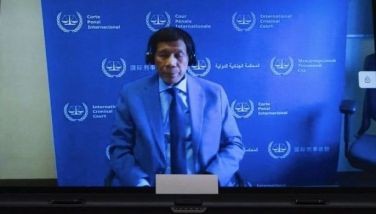‘Shifting to parliamentary system an amendment, not revision’
October 16, 2006 | 12:00am
Changes made to the 1973 Constitution that merged executive and legislative powers under the Marcos presidency were simply termed as an amendment, proving that the proposed parliamentary switch via a people’s initiative merely amends the 1987 Charter, two constitutional experts said yesterday.
Law school Deans Hermogenes Decano and Daniel Fariñas said the proposed parliamentary shift essentially involves the same concept that led to the changes undertaken in the 1973 Constitution under the late President Ferdinand Marcos, because both constitutional changes involve a shift in the allocation of political power.
They recalled that when the 1973 Constitution underwent changes in 1976 to enable the fusion of the legislative and executive powers of government under the Office of the President, the change was simply called Amendment No. 6 instead of being defined as a revision.
Today, under the people’s initiative, Charter change advocates are pushing for the same fusion of legislative and executive powers of government under a single body in the form of the proposed parliament.
"If a previous case involving the fusion of political powers into one government entity had then been unquestionably acknowledged and unconditionally accepted as a mere amendment," Decano said, "it follows that a subsequent case involving the same fusion and combination of political powers should also be unquestionably acknowledged and unconditionally accepted as another mere amendment."
Fariñas said the sole — but striking — difference between the changes in the 1973 Constitution and the amendment of the 1987 Constitution being sought now is that, while the fusion of the two political branches in the 1973 Charter led to the concentration of power in Marcos’ hands, the proposed parliamentary shift now focuses power in a collegial body comprised of over 250 elected officials.
Groups opposing constitutional reforms have claimed that the people’s initiative being pushed by the Sigaw ng Bayan Movement (SBM) and the Union of Local Authorities of the Philippines (ULAP) on behalf of 6.3 million verified petitioners cannot be considered as valid because the proposed shift to a unicameral parliamentary government makes up a revision of, not just an amendment to, the 1987 Charter.
According to those opposed to Charter change, the people’s initiative is only limited to amendments to the Constitution.
Decano and Fariñas also said the Supreme Court has ruled in several cases that any technical difference between the words "amendment" and "revision" is rendered immaterial once the proposed changes in the Constitution are ratified by the people through a referendum or plebiscite.
If the proposed constitutional changes under the people’s initiative are approved by the majority of Filipino voters, Decano said defining such changes as an amendment or a revision of the Constitution would be rendered irrelevant, as already ruled by the Supreme Court.
He said that even the federal constitution of the United States, from which the Philippine Constitution extensively adopts its principles, does not use the word "revision" because there is actually no distinction between this term and the word "amendment."
Fariñas said the terms "amendment" and "revision" mean the same to the people, who are considered the prime authors of the Constitution, thus, there should be no distinction between the two as claimed by groups questioning the people’s initiative.
"There is no strict technical distinction whatsoever between an amendment and a revision with respect to the nature and extent of the changes insofar as the people are concerned," Fariñas said.
The two law school deans said that even law practitioners define the words "amend" and "revise" to pertain to changes instead of their strictly technical definitions that involve fine distinctions between the two words.
Assuming for the sake of argument that there are fine technical distinctions between the words "amendment" and "revision," they said the parliamentary switch proposed by 6.3 million petitioners constitutes only an amendment to a portion of the Constitution — not a revision of the entire Charter.
The people’s initiative only seeks a change in the form of government under Articles VI and VII, leaving the rest of the 16 Articles untouched, they added.
Law school Deans Hermogenes Decano and Daniel Fariñas said the proposed parliamentary shift essentially involves the same concept that led to the changes undertaken in the 1973 Constitution under the late President Ferdinand Marcos, because both constitutional changes involve a shift in the allocation of political power.
They recalled that when the 1973 Constitution underwent changes in 1976 to enable the fusion of the legislative and executive powers of government under the Office of the President, the change was simply called Amendment No. 6 instead of being defined as a revision.
Today, under the people’s initiative, Charter change advocates are pushing for the same fusion of legislative and executive powers of government under a single body in the form of the proposed parliament.
"If a previous case involving the fusion of political powers into one government entity had then been unquestionably acknowledged and unconditionally accepted as a mere amendment," Decano said, "it follows that a subsequent case involving the same fusion and combination of political powers should also be unquestionably acknowledged and unconditionally accepted as another mere amendment."
Fariñas said the sole — but striking — difference between the changes in the 1973 Constitution and the amendment of the 1987 Constitution being sought now is that, while the fusion of the two political branches in the 1973 Charter led to the concentration of power in Marcos’ hands, the proposed parliamentary shift now focuses power in a collegial body comprised of over 250 elected officials.
Groups opposing constitutional reforms have claimed that the people’s initiative being pushed by the Sigaw ng Bayan Movement (SBM) and the Union of Local Authorities of the Philippines (ULAP) on behalf of 6.3 million verified petitioners cannot be considered as valid because the proposed shift to a unicameral parliamentary government makes up a revision of, not just an amendment to, the 1987 Charter.
According to those opposed to Charter change, the people’s initiative is only limited to amendments to the Constitution.
Decano and Fariñas also said the Supreme Court has ruled in several cases that any technical difference between the words "amendment" and "revision" is rendered immaterial once the proposed changes in the Constitution are ratified by the people through a referendum or plebiscite.
If the proposed constitutional changes under the people’s initiative are approved by the majority of Filipino voters, Decano said defining such changes as an amendment or a revision of the Constitution would be rendered irrelevant, as already ruled by the Supreme Court.
He said that even the federal constitution of the United States, from which the Philippine Constitution extensively adopts its principles, does not use the word "revision" because there is actually no distinction between this term and the word "amendment."
Fariñas said the terms "amendment" and "revision" mean the same to the people, who are considered the prime authors of the Constitution, thus, there should be no distinction between the two as claimed by groups questioning the people’s initiative.
"There is no strict technical distinction whatsoever between an amendment and a revision with respect to the nature and extent of the changes insofar as the people are concerned," Fariñas said.
The two law school deans said that even law practitioners define the words "amend" and "revise" to pertain to changes instead of their strictly technical definitions that involve fine distinctions between the two words.
Assuming for the sake of argument that there are fine technical distinctions between the words "amendment" and "revision," they said the parliamentary switch proposed by 6.3 million petitioners constitutes only an amendment to a portion of the Constitution — not a revision of the entire Charter.
The people’s initiative only seeks a change in the form of government under Articles VI and VII, leaving the rest of the 16 Articles untouched, they added.
BrandSpace Articles
<
>
- Latest
- Trending
Trending
Latest
Trending
Latest
Recommended

































